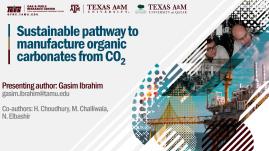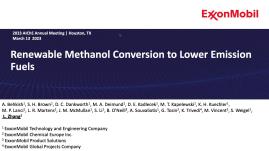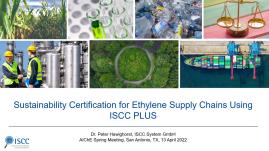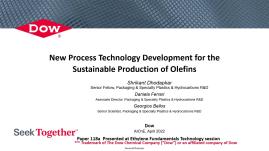Webinars & Conference Presentations
There are various molecules of interest in energy transition. These molecules are, potentially, carbon dioxide (CO2), ammonia (NH3), hydrogen (H2), etc. Safe transportation of produced CO2, NH3, and H2 becomes extremely important for an efficient energy transition in the industry. The...Read more
As concerns surrounding climate change increase and widespread embracement of technology as a solution to the issue grows, greenhouse gas emissions-intensive industry is facing significant pressure to commit to ambitious sustainability targets and decarbonize their operations....Read more
Coolbrook is a Finnish-Dutch-British technology and engineering company on a mission to de-carbonize major industrial sectors such as petrochemicals and chemicals, iron and steel and cement. Coolbrook's proprietary, revolutionary RotoDynamic Technology generates process heating for...Read more
History of Topping Plants:
The US military began operating topping plant refineries in remote locations during World War II to provide fuel for the war effort. In 1944 General MacArthur requested the US Army develop the Klamano oil fields in Papua New Guinea to provide basic...Read more
A global endeavor is in progress to diminish greenhouse gas (GHG) emissions in response to mounting concerns regarding human-induced climate change. In 2020, industrial greenhouse gas emissions amounted to 8.5 GtCO2, contributing to roughly 24% of total global anthropogenic...Read more
Dimethyl carbonate (DMC) is known to be a safe and non-corrosive material that has wide range of applications. For example, it can be used as a fuel additive for gasoline and diesel to improve their combustion efficiency and reduce the pollutants emission. DMC has been manufactured...Read more
Dry reforming of methane (DRM) offers an avenue for converting carbon-dioxide (CO2) and methane (CH4), the two major greenhouse-gases, into syngasâ a vital chemical precursor. However, DRM is constrained by high energy-demands, catalyst-...Read more
At a critical juncture in the petrochemical industry's evolution, the majority of olefin producers have made unequivocal commitments to ambitious net-zero targets by 2050. Simultaneously, technology companies have recently pioneered essential technological tools for the impending net-...Read more
Most companies, including olefins producers, have announced ambitious goals towards carbon neutrality. Nearly all new olefins projects include requirements to reduce or eliminate carbon emissions, even though the production of olefins is a highly energy intensive process.
...Read more
Abstract:
Jhansi Kandasamy, director of INL’s Net Zero Program, will present an overview of INL’s strategy to achieve net zero by 2031. The strategy will integrate emissions reductions of many types, along with continuing...Read more
Description:
This presentation will review the current status and developing future policy and regulation regarding plastic waste and...Read more
Abstract
Residential space heating accounts for a large portion of the total annual home energy use. The main source of energy for residential space
The circular economy and the bioeconomy continue to grow. Both have the goal of reducing the dependence on virgin, fossil resources and of reducing GHG emissions. Legal framework requirements




























